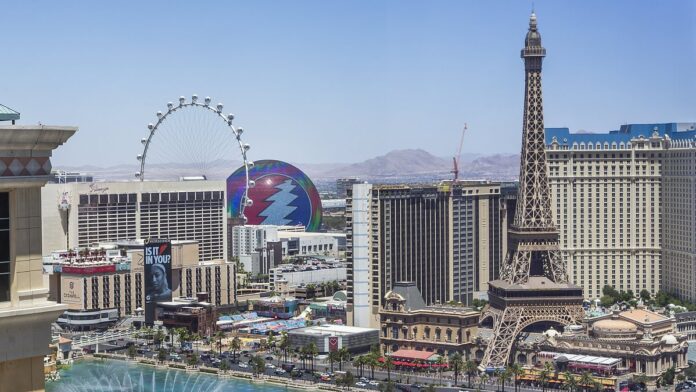The Current State of Las Vegas Real Estate: A Closer Look at the Hughes Center Office Park
Las Vegas, known for its vibrant nightlife and entertainment options, is witnessing a significant shift in its real estate landscape. One of the more alarming developments is the recent sale of the Hughes Center office park, a 55-acre property located just a mile from the iconic Las Vegas Strip. This sale comes at a time when the city is grappling with declining demand in both residential and commercial real estate, raising concerns among locals about the future of Sin City.
A Gloomy Market
The Las Vegas Convention and Visitors Authority reported a 6.7 percent drop in visitors compared to last August, adding to a worrying trend marked by year-over-year losses of 11.3 percent in June and 12 percent in July. These statistics reflect broader issues within the city, where both tourism and real estate are facing crises. Residents and seasoned visitors are beginning to voice fears that the city is ‘dying,’ caught in the grips of rising prices and a housing market that has effectively frozen due to high costs.
The Hughes Center: A Historical Perspective
Originally considered one of Las Vegas’s premier office parks, the Hughes Center once boasted high occupancy rates and prestigious tenants, including Morgan Stanley and Deloitte. However, its status has eroded drastically over time. The office park was sold for $347 million in 2013 but has since been plagued by increasing vacancy rates, which have swelled to about 55 percent today. At its peak, the center was 94 percent leased, signaling a stark contrast to its current situation.
Sale Details and Prospective Buyers
Listing agent Michael Parks from CBRE Group has highlighted that no asking price has been set for the sale, which is a notable departure from standard practice. However, he conservatively estimates that the property could sell for between $200 million and $250 million. Parks indicated that potential buyers could range widely—from traditional office landlords to developers interested in mixed-use projects, reflecting a growing interest in repurposing commercial real estate.
Urban and Economic Implications
The Hughes Center’s sale underscores a troubling trend in Las Vegas’s broader economic climate. With nearly 300,000 fewer visitors each month in 2025, businesses are feeling the pinch. The decline in foot traffic translates directly to a decrease in customer bases for local enterprises, raising alarms about the viability of sustaining new businesses in the area. The stunt in tourism could hinder corporate relocations or expansions within the city, further complicating the local economy’s recovery.
Blackstone’s Shift
The property’s challenges intensified when its owner, Blackstone, ceased payments on a $325 million loan for the Hughes Center as of April 2023. The rationale behind this decision points to a strategic pivot toward multifamily and industrial real estate rather than traditional office spaces. This shift has led to the court appointing Logic Commercial Real Estate to oversee the property, a move indicative of the serious operational issues facing the Hughes Center.
Quality and Value in a Changing Landscape
Despite the challenges, Michael Hsu, another broker involved in the sale, noted that the Hughes Center comprises ‘high-quality space.’ This presents a unique opportunity for seasoned investors. A savvy buyer could potentially acquire the property at a significant discount compared to what it would cost to develop a similar space from the ground up.
The Broader Picture of Las Vegas
The situation at the Hughes Center reflects deep-seated issues within the Las Vegas real estate market, which has seen a recalibration of demand in both commercial and residential sectors. With occupancy rates faltering and prices continuing to rise, the city’s ability to attract both visitors and businesses is becoming increasingly tenuous. The implications stretch beyond just one property, impacting local employment, business viability, and the overall economic health of the region.
As this once-thriving hub of business and commerce faces its future, the eyes of investors and residents alike will certainly remain keenly focused on how Las Vegas navigates these turbulent times.
